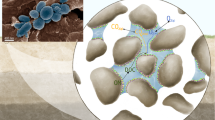Abstract
THE possibility of devernalization by high temperature was demonstrated in previous work1; but the aim then was to show that it is low temperature rather than restriction of growth which is the determining factor in vernalization. To separate these factors, anaerobic conditions were imposed during the period of high-temperature treatment, and misconceptions have arisen as to the validity of the results on this ground2,3,4.
This is a preview of subscription content, access via your institution
Access options
Subscribe to this journal
Receive 51 print issues and online access
$199.00 per year
only $3.90 per issue
Buy this article
- Purchase on Springer Link
- Instant access to full article PDF
Prices may be subject to local taxes which are calculated during checkout
Similar content being viewed by others
References
Gregory, F. G., and Purvis, O. N., Ann. Bot., N.S., 2, 753 (1938).
Whyte, R. O., Biol. Rev., 14, 51 (1939).
M. A. O., Herb. Rev., 8, 83 (1940).
Bassarskaya, M. A., and Grossman. V. Ju., Herb. Abstr. Suppl. II, 11, 11 (1941).
Efeikin, A. K., C.R. Acad. Set. U.S.S.R., 30 (7), 661 (1941).
Tetjurev, V. A., C.R. Acad. Sci. U.S.S.R., 30 (2), 189 (1940).
Gregory, F. G., and Purvis, O. N., Ann. Bot. N.S., 2, 237 (1938).
Author information
Authors and Affiliations
Rights and permissions
About this article
Cite this article
PURVIS, O., GREGORY, F. Devernalization by High Temperature. Nature 155, 113–114 (1945). https://doi.org/10.1038/155113a0
Issue Date:
DOI: https://doi.org/10.1038/155113a0
This article is cited by
-
HEAT SHOCK TRANSCRIPTION FACTOR B2b acts as a transcriptional repressor of VIN3, a gene induced by long-term cold for flowering
Scientific Reports (2022)
-
Der Einflu� einer Devernalisation auf die Frostresistenz vernalisierter Gerste
Die Naturwissenschaften (1962)
-
Untersuchungen zur physiologischen Charakterisierung unserer Weizensorten
Der Züchter (1953)
-
Reversal of Vernalization by High Temperature
Nature (1948)
-
Effect of High Temperature on Vernalized Mustard Seed
Nature (1946)
Comments
By submitting a comment you agree to abide by our Terms and Community Guidelines. If you find something abusive or that does not comply with our terms or guidelines please flag it as inappropriate.



